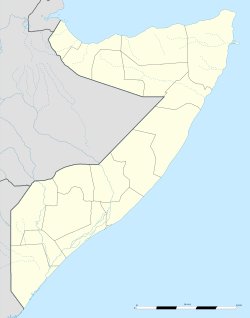
Somalia, officially the Federal Republic of Somalia is a sovereign country located in the Horn of Africa. It is bordered by Ethiopia to the west, the Gulf of Aden to the north, the Guardafui Channel and Somali Sea to the east, and Kenya to the southwest. The country claims a border with Djibouti through the disputed territory of Somaliland. Somalia has the longest coastline on Africa's mainland, and its terrain consists mainly of plateaus, plains, and highlands. Climatically, hot conditions prevail year-round, with periodic monsoon winds and irregular rainfall.
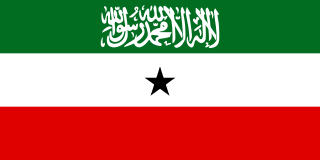
Somaliland, officially the Republic of Somaliland, is a self-declared state, internationally considered to be an autonomous region of Somalia. The government of the de facto state of Somaliland regards itself as the successor state to the former British Somaliland protectorate, which, in the form of the briefly independent State of Somaliland, united as scheduled on 1 July 1960 with the Trust Territory of Somaliland to form the Somali Republic.
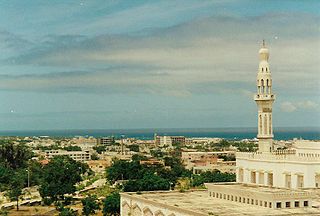
Mogadishu, locally known as Xamar or Hamar, is the capital and most populous city of Somalia. Located in the coastal Banadir region on the Somali Sea, the city has served as an important port for millennia. The original inhabitants are known as Reer Xamar. As of 2017, it had a population of 2,425,000 residents. Mogadishu is the nearest foreign mainland city to Seychelles, at a distance of 835 mi (1,344 km) over the Somali Sea.

The Horn of Africa is a peninsula in Africa. It lies along the southern side of the Red Sea and extends hundreds of kilometers into the Gulf of Aden and Somali Sea. The area is the easternmost projection of the African continent. Referred to in ancient and medieval times as the land of the Barbara and Habesha, the Horn of Africa denotes the region containing the countries of Djibouti, Eritrea, Ethiopia, and Somalia.

Puntland, officially the Puntland State of Somalia, is a region in northeastern Somalia. Centred on the town of Garoowe in the Nugal province, its leaders declared the territory an autonomous state in 1998 but is internationally recognized as an autonomous region of Somalia.
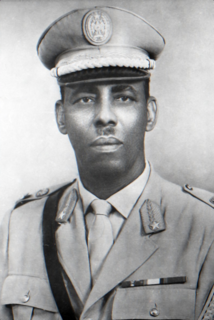
Jaalle Mohamed Siad Barre was a Somali politician who served as the President of the Somali Democratic Republic from 1969 to 1991.

Somali is an Afroasiatic language belonging to the Cushitic branch. It is spoken as a mother tongue by Somalis in Greater Somalia and the Somali diaspora. Somali is an official language of Somalia, a national language in Djibouti, and a working language in the Somali Region of Ethiopia and also in North Eastern Kenya. It is used as an adoptive language by a few neighboring ethnic minority groups and individuals. The Somali language is written officially with the Latin alphabet.

The Somali are an ethnic group belonging to the Cushitic peoples native to Greater Somalia. The overwhelming majority of Somalis speak the Somali language, which is part of the Cushitic branch of the Afroasiatic family. They are predominantly Sunni Muslim. Ethnic Somalis number around 28-30 million and are principally concentrated in Somalia, Ethiopia, Kenya, and Djibouti (534,000). Somali diasporas are also found in parts of the Middle East, North America, Western Europe, African Great Lakes region, Southern Africa and Oceania.

The Ogaden War, or the Ethio-Somali war, was a Somali military offensive between July 1977 and March 1978 over the disputed Ethiopian region of Ogaden, which began with the Somali invasion of Ethiopia. The Soviet Union disapproved of the invasion and ceased its support of Somalia, instead starting to support Ethiopia. Ethiopia was saved from a major defeat and a permanent loss of territory through a massive airlift of military supplies, the arrival of 16,000 Cuban troops, 1,500 Soviet advisors and two brigades from South Yemen, also airlifted to reinforce Harar. The Ethiopians prevailed at Harar, Dire Dawa and Jijiga, and began to push the Somalis systematically out of the Ogaden. By March 1978, the Ethiopians had captured almost all of the Ogaden, prompting the defeated Somalis to give up their claim to the region. A third of the initial Somali National Army invasion force was killed, and half of the Somali Airforce destroyed; the war left Somalia with a disorganized and demoralized army and an angry population. All of these conditions led to a revolt in the army which eventually spiraled into a civil war and Somalia's current situation.

The Somali Civil War is an ongoing civil war taking place in Somalia. It grew out of resistance to the military junta led by Siad Barre during the 1980s. By 1988–1990, the Somali Armed Forces began engaging various armed rebel groups, including the Somali Salvation Democratic Front in the northeast, the Somali National Movement in the northwest, and the United Somali Congress in the south. The clan-based armed opposition groups eventually managed to overthrow the Barre government in 1991.

Garissa is the capital of Garissa County, Kenya. It is situated in the former North Eastern Province. Residential areas in Garissa are called bulas. The main bulas are Bula Taqwa, Mzuri, Garissa yarey, Bula punda, Bula sheikh, Bula cadan, and Bula rig.
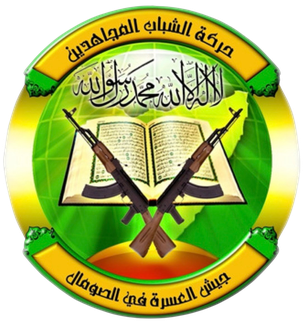
Harakat al-Shabaab al-Mujahideen, more commonly known as al-Shabaab, is a terrorist, jihadist fundamentalist group based in East Africa. In 2012, it pledged allegiance to the militant Islamist organization Al-Qaeda. In February 2012, some of the group's leaders quarreled with Al-Qaeda over the union, and quickly lost ground. Al-Shabaab's troop strength was estimated at 7,000 to 9,000 militants in 2014. As of 2015, the group has retreated from the major cities; however, al-Shabaab still controls large parts of the rural areas.

Copernicia baileyana (yarey) is a palm which is endemic to eastern and central Cuba. Like other members of this genus, C. baileyana is a fan palm. Trees are 10 to 20 metres tall with stems 40 centimetres in diameter and are sometimes swollen. The fruit is black, 1.8 to 2.3 centimetres long and 1.8 to 2 cm in diameter.
Copernicia yarey is a palm which is endemic to Cuba.
Piracy off the coast of Somalia occurs in the Gulf of Aden, Guardafui Channel and Somali Sea, in Somali territorial waters and other areas. It was initially a threat to international fishing vessels, expanding to international shipping since the second phase of the Somali Civil War, around 2000.

Djibouti is a country located in the Horn of Africa. It is bordered by Somalia in the south, Ethiopia in the south and west, Eritrea in the north, and the Red Sea and the Gulf of Aden in the east. Across the Gulf of Aden lies Yemen, which does not share a land border with Djibouti. The country has a total area of 23,200 km2 (8,958 sq mi). The state of Djibouti is predominantly inhabited by two ethnic groups, the Somali and the Afar people, with the former comprising the majority of the population.

The 2009–present phase of the Somali Civil War is concentrated in southern and central Somalia. It began in early February 2009 with the conflict between the forces of the Federal Government of Somalia, assisted by African Union peacekeeping troops, and various militant terrorist groups and factions. The violence has displaced thousands of people in the southern part of the country. The conflict has also seen fighting between the Sufi Ahlu Sunna Waljama'a and Al-Shabaab.

Indirect presidential elections were held in Somalia on 10 September 2012. The newly appointed Federal Parliament elected Hassan Sheikh Mohamud as the first President of Somalia since the dissolution of the Transitional Federal Government (TFG). The election had previously been scheduled for 20 August, the same day that the mandate of the TFG expired, but was rescheduled for a later date.
The 2019–20 coronavirus pandemic was confirmed to have reached Somalia in March 2020. There is great concern about the possibility of an outbreak in Somalia, due to the country's lawlessness, lack of control by the central government, and lack of healthcare infrastructure.
